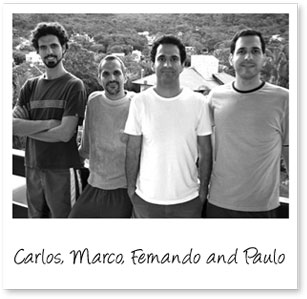A BRIEF HISTORY
Associação Dobem – or simply dobem – was founded on October 21, 2007, by four friends who are brothers: Marco, Fernando, Paulo and Carlos Schultz. The idea had come to them a couple of weeks earlier, in Itacaré, state of Bahia, where they were celebrating their parents’ fortieth anniversary. Amidst beautiful beaches, the four brothers realized that they had more in common than ever imagined. Each in a separate way, they had all been working with issues related to human development.
Marco has been a yoga and meditation teacher for over eighteen years. Fernando and Paulo are filmmakers and partners in a production company that specializes in music videos and documentaries. Carlos works as a consultant on sustainability-related matters. Through the years, the brothers realized that one of the most effective ways of learning is teaching, and that sharing is actually a great way of keeping the things you love. In Itacaré, they decided to join forces and optimize individual resources. Clearly, working together would make the whole process more productive and enjoyable.
And so, dobem was born. An NGO dedicated to promoting integral human development. That is, development capable of meeting people’s physical, mental, spiritual, social and environmental needs, for a deeper and longer-lasting wellbeing. Motivated and well-organized, the brothers quickly gained their first supporters, and six months after its foundation, dobem was producing the Encontro do Bem Conference – the first of many tools with which the organization intends to be fulfilling its mission statement.
VALUES AND PRINCIPLES
Associação Dobem is registered as a not-for-profit, non-political, non-denominational, non-governmental organization. In accordance to Brazilian law, dobem’s founding members, directors and advisors work on a volunteer basis, without pay.
As stated in the second paragraph of its founding statute, dobem’s mission is “to disseminate knowledge capable of promoting integral human development, so as to fulfilling people’s physical, mental, spiritual, social, and environmental wellbeing needs, by means of conferences, lectures, workshops, printed or digital publications, audio-visual products, and any other forms of communication that exist or may come to be.”






